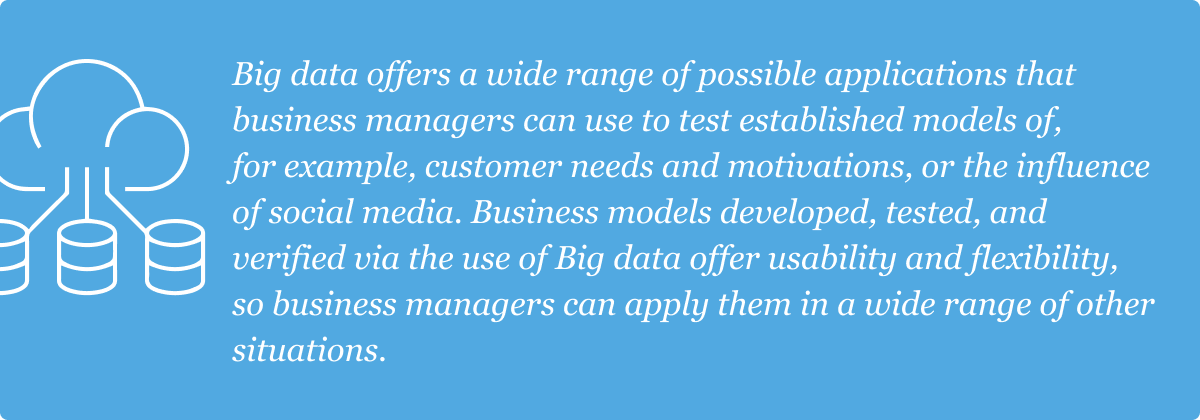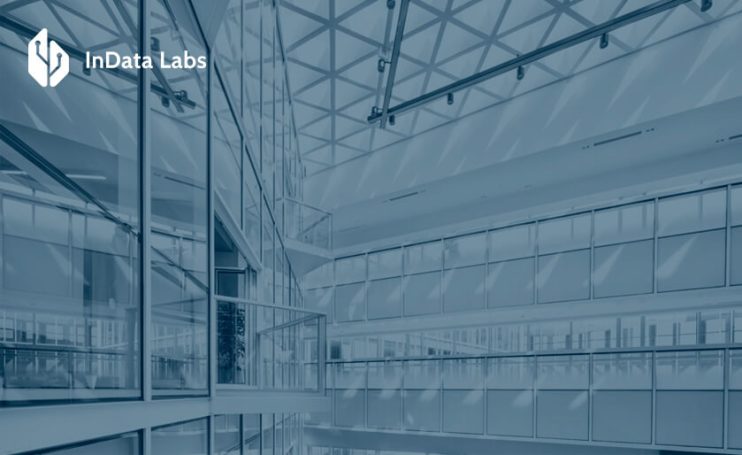Knowing the impact of Big data on society requires first knowing that Big data is one of the most common and contemporary factors of decision-making in the global business sector. Along with factors such as machine learning and artificial intelligence, Big data serves as both a denominator of business productivity and a target for smaller scaled entities.
However, the value of technology goes beyond the world of businesses and account ledgers, setting off research about the impact of Big data on society.

Overview of Big data
What is Big data and why is there so much noise about its applicability and usefulness in business, healthcare, and many other activities? And what are the effects of Big data?
In simple terms, Big data refers to the very massive collection of information that can be subjected to basic and complex analysis to identify patterns and trends for decision-making. This information can revolve around issues as simple as Windows update problems or as complex as environmental issues. Thus, decision-making and the development of better operational systems are the core reasons for the Big data conversation.
Big data is different from a simple data set in many ways. These differences can be categorized under the volume, velocity, variety, veracity, and ultimate value of information. Also, the technology can be sourced from virtually anywhere, not minding whether it is social media or the sales data of a multinational corporation.

Source: Unsplash
Furthermore, Big data can take three forms: unstructured, semi-structured, or structured. Unstructured Big data is the most basic form of data. This is essentially information that has not been sorted. Therefore, it is still in the form in which it was collected.
Semi-structured data, on the other hand, is data that has some level of deliberate system of organization applied to it. A good scheme for identifying this form of data is to find any large collection of information that has metadata attached (for example, IOT Big data), but no real structure.
Structured data is the highest form of Big data and this is the form that holds all the deliberately organized information in easily understandable manners. Every parameter in this form of Big data would already be already identified, so only a bit of Big data analysis would be required before this data can be used to detect patterns and trends, generate insights, and make better decisions which could translate to Big data impact on society.
Big data impact on healthcare
Healthcare is a foundational industry. It is one that still has a lot of uncharted waters because there are still many parts of the human body that we still don’t understand completely.
On the whole, Big data has the potential to provide a launching pad for exploring these obscure areas, thereby offering reliable options for improving human health and comfort.

Source: Unsplash
The following are some of the impacts of Big data on healthcare:
Complete data capturing
The easiest impact of Big data on healthcare is the provision of comprehensive data capture. Due to the critical nature of the health industry, a lot of data is collected and recorded. Because this data is typically in an unstructured form, it is nothing more than a massive trove with no apparent method of usability and relevance.
However, using Big data as the framework for collecting, sorting, and analyzing this enormous trove of information, it becomes easy for the health industry to capture needed data to be used later. Moreover, this information may be real-time and can still be subjected to Big data analytics.
Accurate/reliable testing and evaluation process
Given that the health industry collects and records an enormous amount of data, one would imagine that this information is put to good use.
For example, drug trials is one of the most common applications of data collection and analysis such that constant testing and evaluation would reveal which drug or treatment is effective against an ailment and which is not.
However, due to the size of the data often collected, this testing and evaluation process is often skipped in favor of small-scale experiments with results that cannot be generalized. Thus, the benefits of Big data as voluminous and complex data sets that can be analyzed effectively become very apparent in healthcare.

Source: Unsplash
Extended application of prediction analysis
One common aspect of data analytics in healthcare is prediction analysis. Once again, let’s use drug/treatment trials as an example. Regression analysis is a common statistical method that lets you determine the effect of one or more factors on an outcome. Taken a step further, you can use the model of the relationship between the factors and outcome to predict future interactions between them.
So, binary logistic analysis, for example, tells you that using Treatment A is 70 times more likely to reduce the odds of cardiac arrest in a patient than the use of Treatment B. Even though prediction analysis could be carried out on ordinary ‘small’ data, applying it to Big data offers more confidence in the data and prediction.
Decision-making
Effective and dependable decision-making is the single most biggest impact of Big data in healthcare. Healthcare managers can use the large data sets they collect with statistical and machine learning techniques, thus identifying patterns that allow them to create decision-making models.

Source: Unsplash
Depending on the level of model design, this process can ensure the development of algorithms to identify binary outcomes of treatments (Effective vs Not effective) or the conception of artificial intelligence (AI) to offer suggestions on best practices based on data. All of this rests on Big data which functions as the health sector’s operative framework and basis for the application of technological advancements.
Overall, the benefits of Big data in healthcare are many, ranging from process simplification and automation to cost-effectiveness, all of which ensure the technology impact on society.
Big data and its business impacts
Compared to healthcare, the impact of Big data on retail and other aspects of business is more relatable. This is because the technology is considered an instrument for organizational performance and productivity.
Contemporary trends of digital transformation in business are offshoots of the current landscape and influence of Big data on finance. So, the global finance sector is growing progressively sensitive to Big data and its business impacts.
Nevertheless, the impact of Big data analytics on healthcare and society is mirrored in business. Thus, the subsequent list includes some of the benefits of using Big data in business.
Data capture and evaluation
Similar to how the technology enables healthcare experts to collect all kinds of information without having to filter them or become overwhelmed by their volume, business managers also use it to capture every aspect and dimension of the business environment and process.

Source: Unsplash
With Big data, business managers can more easily use market and organizational tools such as PESTLE and SWOT analyses to evaluate the strengths, weaknesses, opportunities, and threats to their business. This is the basic application of data science impact on business.
Identification of trends and patterns
An open secret of business performance and productivity is trend/pattern. For every business, once the trends of productivity have been identified, it becomes very easy to stimulate desired levels of effectiveness since these trends are recognized factors influencing Big data decision making quality.
For example, where a business manager is interested in internationalization, they would need to identify patterns in foreign markets that boost or bar their chances of entering into and dominating these markets. If the manager can get a hold of a year’s worth of sales’ information on the preferred market, for example, they would be able to find patterns in customer preferences and use these insights to their advantage.

Source: Unsplash
Model testing
In addition to identifying patterns in markets, customer interaction with retailers, and so on, business managers can also use the insight obtained from Big data analytics to design models of organizational productivity beyond theory and speculation.

Policy/strategy development
Subsequent to testing business models, Big data and data analytics have also offered business managers the ability to develop strategies and policies that are consistent with evidence (that is, data).
Using a combination of statistical analytics and machine learning, Big data lets business analysts test and design appropriate strategies based on predicted outcomes of prescribed business processes.
This way, businesses that are large, medium, or small-scaled can use the data available, no matter how enormous or varied, to create unique strategies and policies for every business decision.
Workforce performance evaluation
Big data makes it possible to develop KPIs (key performance indicators) which are fundamental components for measuring the productivity of a business. Imagine if the manager of a multinational company is interested in assessing their workforce based on sales alone, they would have to collect information on a lot of variables.
Leaving out even the smallest aspect of this information bares the risk of leaving out important insights and the possibility of developing usable and flexible KPIs. This is where Big data comes in and offers a variety of data-gathering and analytics principles for these managers to use. Upon using these techniques, business managers will be able to locate and effectively analyze the contributions, motivations, and challenges of their workforce.

Source: Unsplash
Design of system for artificial intelligence
One of the more contemporary uses of Big data in business is Big data app development. This is important for the design of AI systems used to automate business processes such as employee monitoring, KPI development, year-on-year analytics, and more.

This is why corporations like Microsoft and Amazon that use Big data continue to pull further and further away from their competitors, consolidating Big data effects on society.
Cost-effectiveness
Lastly, the impact of Big data on retail is clearly seen in how it enables the development of cost-effective strategies. Supply chain analytics is one of the most common applications of it on this front and it is now recognized as a universally effective strategy for managing logistics and other data-related components of the business process.
Ultimately, Big data helps businesses identify where they can spend less money and make more profit.

Source: Unsplash
Why Big data influences the rise of artificial intelligence
There is no debating that Big data is a root trigger for the rise of AI in recent years. There are multiple reasons, including the following:
- Big data is massive and complex and AI requires an enormous amount of data and complexity to run effectively.
- Big data is not biased towards any particular kind of information, regardless of source and veracity, thereby delivering the level of information and situation variety needed for AI systems to be versatile in their applications.
- There is no regulation on the use of technology, and this furnishes AI developers with an endless source of fuel (data) which they use to create and adapt AI systems to real-life situations.
- Machine learning is the foundation of all AI and it is impossible to use or apply without Big data, especially considering that Big data also allows the inclusion of real-time information.
Overall, Big data analytics and technology’s impact on society is an issue that many intellectuals have debated. There are many reasonable arguments that demonstrate the risks of Big data, including privacy considerations, especially taking social media into account.
However, considering Big data’s effects on society, it is apparent that some of these misgivings can be resolved reasonably and Big data solutions are still applied to ensure that the impact of Big data and social media on society is preserved and maximized. Only then will social networks be an unlimited source of open-sourced data, relevant and reliable AI systems are developed.
Then, corporate and healthcare organizations will be able to reach high levels of performance through the use of data-driven and cost-effective strategies built on Big data.
FAQ
-
Big data refers to vast and complex sets of information that are too large and intricate for traditional data-processing tools to handle effectively.
These data sets often come from various sources, such as social media, sensor networks, transactions, and more. Big Data is typically characterized by the “Three Vs”: volume, velocity, and variety.
- Volume refers to the enormous amount of data generated daily.
- Velocity deals with the speed at which this data is created, processed, and analyzed.
- Variety refers to the different types and formats of data, including structured, semi-structured, and unstructured data like text, images, and videos.
The importance of Big data lies in its ability to provide valuable insights that drive decision-making across industries. By analyzing large-scale datasets, businesses can identify trends, patterns, and correlations that might be invisible in smaller data sets. This leads to improved operational efficiencies, more personalized customer experiences, and the ability to predict future behaviors.
For example, in healthcare, Big data helps in early disease detection and personalized treatments by analyzing patient records, medical history, and other data points. In retail, it allows businesses to understand consumer preferences and offer tailored recommendations.
Ultimately, Big data is crucial because it transforms raw information into actionable insights that enhance innovation, efficiency, and competitive advantage across various sectors.
-
The impact of Big data on society is profound, transforming how we live, work, and interact. By enabling the analysis of vast amounts of information, Big data improves decision-making, drives innovation, and enhances efficiency across sectors like healthcare, education, and government.
It helps businesses offer personalized services, optimizes resource allocation, and aids in predicting societal trends. However, it also raises concerns about privacy, data security, and potential biases in data analysis. The way society adapts to these challenges will shape the future of Big data’s influence, making it a powerful tool for both positive change and ethical responsibility.
-
Yes, Big data is still highly relevant and will continue to play a significant role in the future. As technology advances and the volume of data grows, Big data’s ability to provide valuable insights is more critical than ever. Industries across healthcare, finance, marketing, and more rely on Big data for decision-making, personalized services, and innovation.
The future of Big data lies in its ability to integrate with emerging technologies like artificial intelligence, machine learning, and the Internet of Things (IoT), further expanding its potential. As long as data continues to grow, Big data will remain a powerful tool with vast opportunities for the future.
-
Big data can significantly impact an organization by providing deeper insights into customer behavior, operational efficiency, and market trends. With the ability to analyze large volumes of data, organizations can make data-driven decisions that improve strategy, enhance customer experiences, and optimize resources. It allows for predictive analytics, helping businesses anticipate trends and potential challenges.
Additionally, Big data can drive innovation by uncovering new opportunities and fostering a more agile and competitive approach. However, organizations must also manage data privacy and security concerns to fully harness Big data’s potential.



